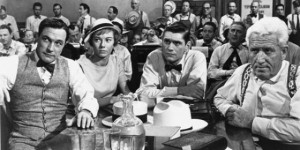Inheriting the Wind
 A still from Inherit the Wind
A still from Inherit the Wind All of us have certain moments we recall that startled us from complacency, jarred our perspective, or informed our future in a way that could not be fully discerned until years later. Back in the late 1960s, when I was about twelve or thirteen, I found myself home sick from school for an entire week. In those days WOR TV in New York City used to have something called The Million Dollar Movie, which was on in the afternoon and again in the evening. They showed old movies and oddly, the same one was replayed every single day that week. On Monday I settled myself under a comforting blanket on the sofa and tuned in to a movie called Inherit the Wind. I came to find out that it was adapted from a play of the same name and based on what was commonly known as the 1925 Scopes Monkey Trial. It’s a great courtroom drama that basically puts the theory of evolution on trial in a contest pitting fictional versions of two of the greatest minds of their generation, Clarence Darrow and William Jennings Bryan, against each other to argue the great question of all time: Where did we come from?
What did I know about any of it? I was a good little Catholic kid, catechism every Saturday, mass every Sunday. The movie’s title was taken from the Book of Proverbs in the Old Testament that said, “He that troubleth his own house shall inherit the wind, and the fool shall be servant to the wise of heart.”
The plot was built around the trial of a teacher named Bertram Cates who was being prosecuted by the State of Tennessee for being in violation of a law that made it a crime to teach anything other than the biblical version of creation in the public schools. The movie starred two of the great actors of any generation, Spencer Tracy and Fredric March playing Henry Drummond (Darrow) and Matthew Brady (Jennings Bryan), respectively. The plot is glued together by the omnipresence of one E. K. Hornbeck (played by Gene Kelly), who, in reality, is a stand-in for H.L. Mencken, who covered the Scopes trial for the Baltimore Sun. Mencken was, for lack of a better description, the Bill Maher of the day, devoting his energies to insuring the discomfort of hypocrites and frauds and doing it with a style that was always eloquent, frequently enlightening, and often merciless.
I was so drawn in by the entire debate and the spectacle of it that I watched it not once, but all five days. Nearing the end of the week I was beginning to be able to recite some of the dialogue. I had never seen or read or heard anything in my young life that squarely challenged religion or religious beliefs. Even at that young age, it began to change my thinking. It provided the first crack in the cramped vessel of faith in which I had been raised and, rather than troubling me, it empowered me in ways that I carry to this day. It made me realize that thinking and reasoning were alright, that there was more than one way to appraise reality, that rather than reciting the answers I had been provided all my life, it was appropriate to ask questions and to demand proof. It let me know that the faith of my Fathers had some serious problems.
I went on to study the matters of science and psychology and philosophy, and compared them to these “immortal truths” I had been taught by the Roman Catholic Church. Those truths did not fare well at all, and by the time I had earned a degree in biology at Stony Brook University, I was a confirmed nonbeliever.
The Scopes trial actually took place in Dayton, Tennessee, in 1925. Inherit the Wind was written by Jerome Lawrence and Robert Lee in 1950, partially in response to the mischief of Joseph McCarthy in the United States Congress. It didn’t arrive on a Broadway stage until 1955 and wasn’t made into a motion picture until 1960. To be certain, up until that point, it seemed the bravest statement ever made in a motion picture and it earned four Academy Award nominations.
In subsequent years, Inherit the Wind has been widely praised, and just as widely criticized by keepers of the faith who took exception to the portrayal of the characters and details of the case as presented in both the play and the movie. There was surely a good deal of exaggeration for dramatic effect, private dialogue assumed, and other points distorted. The film had made religious thinking look deluded, destructive, and often foolish. But it also made its points against the atheistic point of view. In the end it was hypocrisy that suffered most. The authors claimed that they never intended the movie to act as a historical record, but as a dramatization of a much larger debate between the classical and the modern, religion and the secular, and bigotry in all its forms. In that regard, they succeeded mightily. Inherit the Wind has been played on many a stage since the 1950s. I saw a version on Broadway about ten years ago. Like the Bible, and like the debates that incredibly nag us to this very day, Inherit the Wind is not going away.
